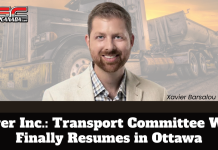Recently, several trucking companies have voiced concerns about the “Driver Inc.” model, which allows drivers to incorporate themselves, and Eric Gignac from Guilbault is among them.
This model raises significant issues in the industry, prompting calls for swift government intervention to restore tax fairness, stop driver exploitation, and ensure healthy competition in the trucking sector.
After hosting Réal Gagnon, who criticized this scheme, a letter was sent to Minister Stephen MacKinnon. MacKinnon responded, and who better than Eric Gignac, CEO of Guilbault, to provide his expert insight on the matter?
“I think I’d like to work in government or communications,” Gignac responds, “because you just copy-paste the same answer and send it to anyone. It’s always the same story. They tell us they’re working hard, maybe they are. The word ‘hard’ might be a bit much. But if they say in their responses that they will find effective and fair solutions to solve the problem… They’ve modified the labor code… Well, look, just enforce the law!”
This is a situation where regulations exist but are not being enforced. The Driver Inc. model conflicts with the tax obligations that companies must comply with. Like every other transportation company in Quebec, and in many parts of Canada, Guilbault fulfills its tax responsibilities by paying source deductions for its employees.
Gignac expresses his frustration with the unfair competition: when companies employing incorporated drivers bid on contracts with discounts of over 20%, it becomes nearly impossible to compete while adhering to existing tax rules.
“We feel like the joke’s on us. Some of my competitors have lost major clients. For me, it’s already started. It’s not huge yet, but we feel the pressure from our clients, asking why we’re 20%, 25% more expensive than others. So, at that point, I pull out my ‘good corporate Canadian citizen’ tape and explain that we pay our taxes, our employees, and we owe nothing to the government. At the end of the month, everything is paid and settled.”
Gignac is clearly agitated by the current situation. According to him, if some companies want to play that game, it will soon be played by two. He even questions whether he should start a division with incorporated drivers to retain his clients. He feels almost forced to lower his prices to stay competitive and keep his employees working, but he knows this strategy is not sustainable in the long run.
While some question the effectiveness of the Association du Camionnage du Québec (ACQ), a Quebec trucking association, and the industry’s mobilization to be heard, Gignac insists that superhuman efforts are being made to provoke change. At the provincial level, authorities often claim the issue is federal.
However, Gignac proposes a solution: by linking the Canada Revenue Agency (CRA) with highway inspectors, checks could be carried out at weigh stations, and the information shared with the CRA, and vice-versa. With genuine intent, concrete solutions could be implemented. However, he acknowledges that the provincial government is limited in its actions. As for the federal government, Gignac goes so far as to describe the current administration as a “ghost government,” virtually non-existent in his view.
He highlights that a significant portion of the Liberal Party’s electorate comes from areas like Brampton, with strong support from certain cultural communities, a key source of votes. He clarifies that this is not about racism but asserts that Justin Trudeau and his team need to act quickly to bring about solutions.
Gignac also laments the Canadian Trucking Alliance’s (CTA) lack of power, which should represent the industry’s interests in Ottawa. He notes that the CTA has lost influence, referencing the absence of recent meetings with key figures like Pablo Rodriguez, compared to Marc Cadieux of the ACQ, who has been very active on the “Driver Inc.” issue. The CTA seems too aligned with the opposition, a risky stance given the upcoming political uncertainties.
He concludes by noting that this agitation is not limited to Quebec: associations in Alberta and Saskatchewan are also beginning to voice their discontent; things are heating up.
“The big problem, in my opinion, is twofold. One: For our industry, we need to move towards driver certification in Canada—not just Quebec, but Canada-wide. How to achieve that is still a bit unclear, but it’s a topic that has been discussed for years at the CTA. A professional order. These are issues I’ve heard about at least two or three years ago, as a Quebec representative at the CTA.”
The problem with both provincial and federal governments is that many other sectors, like doctors and construction workers, also use the incorporation model. These groups benefit from the “incorporated” status, creating a precedent that’s hard to ignore. The prevailing thought is that if it’s allowed in one sector, it should be allowed in others. However, tackling this issue could lead to significant revenue recovery for the government—potentially billions of dollars.
Yet, with federal elections approaching next year, followed by provincial elections in two years, there seems to be little political will to make such significant changes.
“I won’t make any friends by saying this, but some trucking influencers out there want to block roads, organize convoys… For me, that’s a no. One thing is for sure. Claude Robert, Michel Robert, Eric Gignac, and David Morneau—we’re not going to abandon our thousands of employees for that. We’re going to fight. Guilbault has been around for 96 years. There’s no way I’m going to shut down my company or start losing money because of an issue with incorporated drivers.”
“We’re going to move, and we’re going to do it intelligently. We mustn’t lose our credibility; we need to handle things in a smart, structured way. Eventually, we’ll reach a point where it will hurt. Truckers like us, companies like ours, we need to strike in the right places.”














